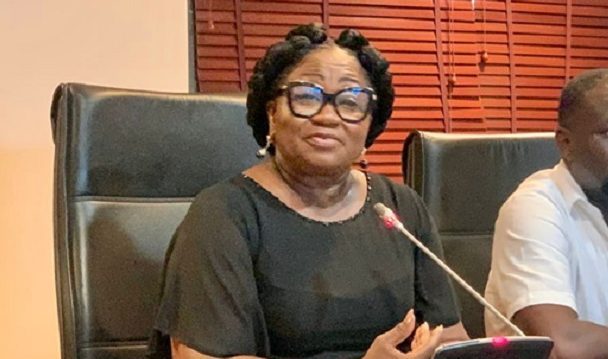The Minority in Parliament has issued a strong call for action, urging legislators to stand firm in defense of judicial independence and the very underpinnings of Ghana’s democracy, which they contend are presently endangered. The Minority caucus asserts that Parliament must urgently re-establish its authority in oversight, acting as a critical bulwark to preserve democratic principles against any encroachment of authoritarian tendencies or lose its relevance.
During her welcome address on Tuesday, May 27, marking the resumption of the 9th Parliament’s first session’s second meeting, Deputy Minority Leader Hon. Patricia Appiagyei stated that the legislative body cannot afford to be a mere footnote in any narrative of Ghana’s democratic erosion.
“It is incumbent upon us to rise, to voice our concerns, to act—and if need be, to resist. The President and his administration must accept their responsibilities. The era of deflection has passed; the time for accountability has arrived,” she declared.
Also Read: Mahama outlines 8-pillar strategy to transform Ghana
Hon. Appiagyei further stressed that the House’s legitimacy is inextricably linked to public trust, cautioning that inaction, while the Judiciary faces attacks, would constitute an undeniable abdication of their legislative responsibilities.
The Deputy Minority Leader condemned what she termed a “calculated weaponization of constitutional mechanisms” by the executive branch, referring to the Chief Justice’s suspension and purported maneuvers to fill the Supreme Court with sympathetic figures.
“When legal practitioners with known ties to both the President and the Speaker are spearheading a petition for the Chief Justice’s removal, it becomes incredibly challenging to separate such actions from political interference,” she observed.
She warned Parliament against passivity: “This is not the practice of constitutional governance—it is a consolidation of control. Should this House neglect to scrutinize this critical juncture, we lose relevance and risk becoming accomplices in the gradual stifling of judicial autonomy in Ghana.”
Addressing foreign policy, the Deputy Minority Leader criticized the recent shutdown of Ghana’s Embassy in Washington, D.C. She referenced Foreign Minister Samuel Okudzeto Ablakwa’s explanation attributing the closure to alleged internal corruption but countered that closing a key diplomatic mission over a single staff member’s misconduct was both an overreaction and a display of diplomatic inexperience. An immediate appearance by the Foreign Minister before Parliament was demanded, along with complete transparency regarding the decision and its consequences. “Upholding accountability within the Foreign Service is a national imperative, not just a catchphrase,” she insisted.
Regarding domestic issues, Hon. Appiagyei painted a picture of a nation in crisis, stressing delayed infrastructure development, outstanding statutory fund payments, and an apparent “power vacuum at the leadership apex” following President Mahama’s alleged failure to formally transfer executive powers during a trip abroad.
“The security situation nationwide has worsened. Ghanaians live in fear, while their government seems oblivious to their anxieties,” she lamented.
She aimed at the Mahama administration’s management of the economy and the persistent power shortages, stating: “Dumsor has resurfaced—and with a severity reminiscent of Ghana’s most challenging power crises, compounded by teachers now threatening to arm themselves in schools as a protective measure against unprovoked attacks.”
Further concerns were voiced by the Deputy Minority Leader about purported corruption and power abuses within the current government. She challenged the constitutionality of the President compelling appointees to donate to the Mahama Cares Initiative, arguing that such matters should be directed to CHRAJ. “This isn’t philanthropy—it’s a clear violation of the Constitution,” she maintained, adding that lawful sanctions cannot be unilaterally replaced by presidential “pet projects.”
On the subject of presidential travel, she expressed alarm regarding the ongoing use of private aircraft purportedly owned by the President’s brother. She emphasized that if Mr. Ibrahim Mahama is funding these flights, the Ghanaian public has a right to know what benefits he is receiving in exchange.
Hon. Appiagyei also called Parliament’s and the nation’s attention to the President’s unmet commitments, such as the pledge to repeal the COVID-19 levy and address illegal mining. “We are waiting for action. Ghana cannot sustain leadership that operates on deflection and denial,” she urged.
The delayed announcement of election results in Ablekuma North also drew her condemnation, with a call to the Electoral Commission to “ensure democracy prevails without further postponement.”
She then laid down a direct challenge to all members of the House: “Parliament must cease to function as a simple conduit for Executive desires. We must unify our voices to demand that the rule of law, not arbitrary discretion, dictates the governance of this Republic.”
She reminded MPs that their authority rests on public confidence. “If we stand by passively while the Judiciary is threatened, while citizens perish in floods, while educators feel compelled to carry weapons… then the state itself risks losing its relevance to the people it is meant to serve.” She reaffirmed the Minority’s commitment to act as a constitutional safeguard, vowing not to be intimidated by the Majority’s strength and to resist any attempts to undermine Ghana’s democracy.
By Osumanu Al-Hassan/thenewsbulletin24.com


